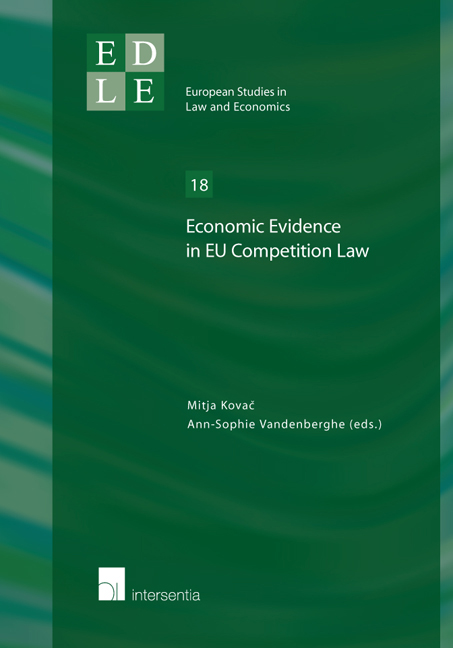Book contents
- Frontmatter
- Dedication
- Preface
- Contents
- List of Contributors
- General Introduction
- PART I ECONOMIC METHODS IN COMPETITION LAW
- PART II ECONOMIC EVIDENCES IN COMPETITION LAW
- PART III INSIDER TRADING, CARTELS AND CRIMINALISATION
- PART IV PRELIMINARY RULINGS AND STATE AID CONTROL
- PART V ECONOMIC EVIDENCE, ENFORCEMENT PROBLEMS AND NATIONAL COURTS
- Index
General Introduction
Published online by Cambridge University Press: 21 September 2018
- Frontmatter
- Dedication
- Preface
- Contents
- List of Contributors
- General Introduction
- PART I ECONOMIC METHODS IN COMPETITION LAW
- PART II ECONOMIC EVIDENCES IN COMPETITION LAW
- PART III INSIDER TRADING, CARTELS AND CRIMINALISATION
- PART IV PRELIMINARY RULINGS AND STATE AID CONTROL
- PART V ECONOMIC EVIDENCE, ENFORCEMENT PROBLEMS AND NATIONAL COURTS
- Index
Summary
This book is motivated by two developments in EU competition law: first, the wider role for national courts to apply and enforce EU competition law, and second, the increasing use of economic theory and economic evidence in competition cases. Since regulation 1/20031, national courts play a key role in the enforcement of European competition policy in a variety of scenarios. Some courts act as review courts, hearing appeals which are brought against decisions of the national competition authorities and some courts have jurisdiction over law suits between two private parties, such as actions relating to contracts or actions for damages. The provisions of EU competition law are to a significant extent vague or open-textured, and thus leave scope for different interpretations as to the precise legal content to be applied in specific cases. In a decentralized system where rules are applied by competition authorities and courts from different countries, there is a risk that the rules are not applied uniformly. However, the European Commission is committed to assisting national courts in order to ensure a coherent application of the provisions throughout Europe. The increasing use of economic theory and economic evidence in competition cases is a reflection of the economic approach to competition law. Since the late nineties the Commission has indicated to favor the economic approach to competition law over a pure legal-formalistic approach. The economic approach essentially boils down to a functional interpretation of competition law which means that rules are construed so as to achieve the objective of welfare maximization. This objective would only be randomly achieved, at the expense of numerous errors, if economic thinking and market dynamics would be ignored. Competition law must therefore be guided by economic analysis, otherwise the law acts blindly upon forces it does not understand and produces results it does not intend. Economic analysis can inform competition law about how a decision model should look like (i.e. which questions to ask and in what order, when evaluating whether a competition infringement exists) in order to minimize the social costs of decision errors. A type I error (false positive) exists when competition authorities or courts conclude that a particular act is illegal where in reality the act is good from a social welfare perspective.
- Type
- Chapter
- Information
- Economic Evidence in EU Competition Law , pp. 1 - 10Publisher: IntersentiaPrint publication year: 2016



